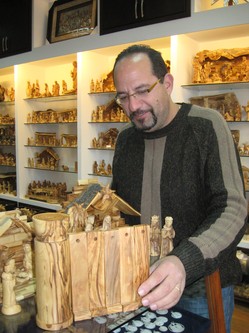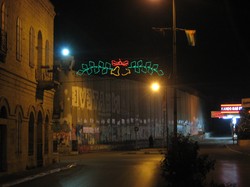The streets of Bethlehem were brightly lit with multi-colored lights, stars, bells and angels as Christmas 2011 was celebrated in the “little town” that is becoming smaller and smaller, said the Rev. Mitri Raheb in his opening remarks at a Christmas Eve service at the Evangelical Lutheran Christmas Church here.
In the months leading up to Christmas and the end of 2011, Israel announced plans to continue to expand settlement construction north and west of the city. In late September, it was announced that 1,100 new housing units would be added to the settlement of Gilo, just north of Bethlehem.
In early December, a group of local Christians comprising Kairos Palestine held a five-day international conference in the city. They issued a document — The Bethlehem Call — to all visitors coming to the Holy Land. “Come and see,” said the Christians of Palestine. “Come and see the olive groves, the bulldozers, the ancient terraces, the segregated cities. The situation is worsening.”
According to the Israeli Ministry of Tourism, between 100,000 and 120,000 people had passed through the main checkpoint, at the nothern entrance to Bethlehem. That meant passing through Israel’s “separation barrier,” an eight-meter high concrete wall with guard towers and a narrow opening, that allows automobiles in and out. Walking out on foot requires passing through a security check at the main terminal building, which requires the removal of all metal from oneself, including watches, belts and shoes.
Israel controls the main entrance to Bethlehem and maintains military checkpoints west and east of the city. However, the southern entrance to Bethlehem is open, which allows locals to travel to/from Hebron, and points south, within the occupied West Bank.
Weeks before Christmas, the city of Bethlehem makes decisions concerning Christmas lighting, and night after night, strings of brightly-colored lights were hung from the main street leading up to the Church of the Nativity, just off Manger Square. The theme for this year’s Christmas celebrations was “Palestine Celebrating Hope.”
Just across Manger Square, and behind the church and up the Milk Grotto street, shop own Jack Giacaman has opened a new store — Christmas House — as part of his family’s souvenir enterprise in the city. The extended family owns several shops in Manger Square as well as several stores along the Milk Grotto Street.

Bethlehem souvenir-shop owner Jack Giacaman displays nativity scenes, complete with Israel's Separation Barrier/Wall. —Doug Dicks
Giacaman has made a modern day nativity set, complete with the traditional characters — Mary, Joseph, the baby Jesus, shepherds and sheep. What is missing in the nativity are the Three Wise Men. They are caught on the opposite side of the separation barrier. He has made several sizes of such creches, from just a few inches to a foot in height. His family owns an olive grove just north of the city, now inaccessible on the other side of the barrier.
Every souvenir shop in Bethlehem now wants to sell a “mini package tour” to tourists — Bethlehem and the wall, Giacaman said.
“‘Where can we go to see the wall?’ visitors ask,” he said. “Every tourist who comes to Bethlehem is shocked by the ugliness of this wall. It is something you cannot hide.”
Hotels were said to be fully booked for this year’s Christmas festivities. But locals claimed that most of the “tourists” were Arab Christians coming from inside Israel, particularly from Nazareth and Galilee. At least eight new hotels are currently under construction in the Bethlehem region.
On Christmas Eve morning, scout troops massed and marched along Bethlehem’s Star Street, the traditional route into Bethlehem in ancient times. They gathered at the Catholic Action Club, awaiting the arrival of the Latin Patriarch of Jerusalem, Fouad Twal. He is met on Manger Square by Bethlehem’s dignitaries, including the mayor, the governor and others. His arrival into the city heralds the beginning of the Christmas Season in Bethlehem.
In his midnight address Twal said, “God wants bridges that unite rather than walls that separate that which God has united.” He continued: “Dear brothers and sisters, let us tear down the walls of our hearts in order to tear down walls of concrete” and “We ask that the road travelled by our ancestors — the Magi and the shepherds — to Bethlehem should remain open, without barriers or hindrance, open to the pilgrims of the whole world, including the Arab world.”
Volunteers dressed in Santa suits passed out postcards from the Palestinian Ministry of Tourism and Antiquities.
By nightfall, a light rain was falling on Manger Square, and would-be revelers were seeking shelter in restaurants, cafes and falafel shops. Others simply went home to escape the rain, which fell heavier as the night went on.
Yet bright lights and a new Christmas tree in the square could still be seen, flashing and blinking as Midnight Mass commenced at St. Catherine’s Church, next to the Church of the Nativity. Well into the night, cars carrying diplomats and dignitaries, including Palestinian President Mahmoud Abbas, made their way through the city streets.
Doug Dicks is the PC(USA)’s regional liaison for Egypt, Jordan, Israel and the Palestinian Territories, including the West Bank, Gaza Strip and Jerusalem. He lives in Amman, Jordan.

